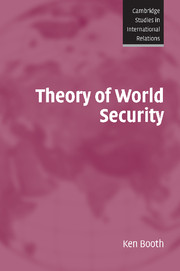Book contents
5 - Being, knowing, doing
Published online by Cambridge University Press: 05 June 2012
Summary
There's philosophy and there's the rest of life.
A. J. AyerThe two previous chapters clarified key concepts relevant to a critical theory of world security. The present chapter begins to relate the discussion so far to the biggest questions of philosophy, before moving in chapter 6 to bring everything together into a comprehensive critical framework. All this takes place in the face of the verdict of Freddy Ayer, the doyen of English logical positivism, about the relationship of philosophy and life. This book, contra Ayer, does not accept the separation.
What is real?
Of all the terms that we employ in treating human affairs, those of natural and unnatural are the least determinate in their meaning.
Adam Ferguson, An Essay on the History of Civil Society (1767)Naked ghosts! One way I have tried over the years to introduce students to thinking about what is real has been to discuss the phenomenon of ghosts, and specifically their reality to some observers – but never a naked reality. Apparently, ghosts never appear in a naked condition. According to Ambrose Bierce in his wonderful Devil's Dictionary, this represents one insuperable obstacle to belief in the existence of ghosts. A ghost may be seen ‘in a winding-sheet’ or ‘in his habit as he lived’. But to believe in ghosts, Bierce contended, one has to believe not only in the power of the dead to make themselves visible ‘after there is nothing left of them’, but also to believe ‘that the same power inheres in textile fabrics’.
- Type
- Chapter
- Information
- Theory of World Security , pp. 182 - 208Publisher: Cambridge University PressPrint publication year: 2007

